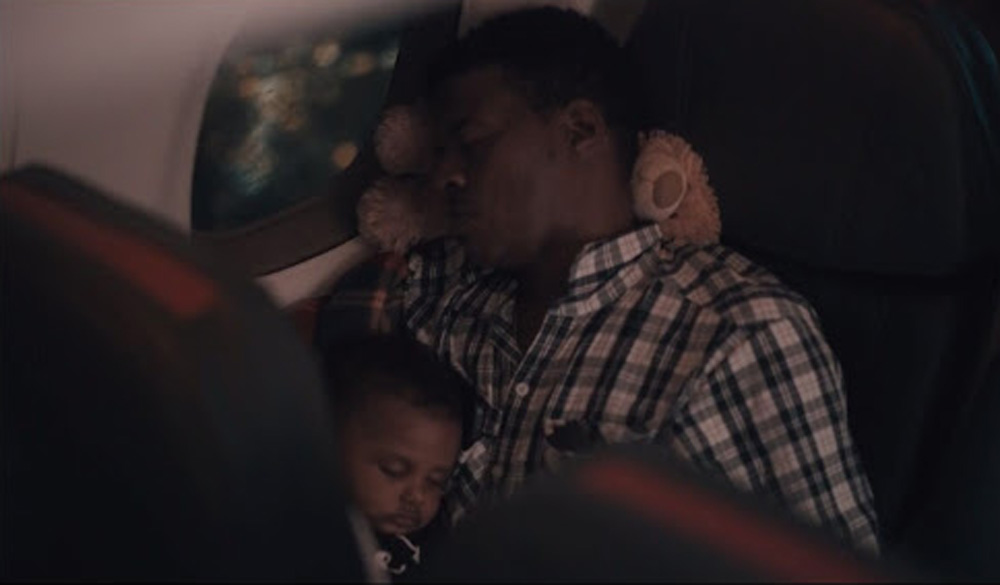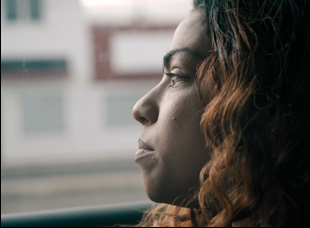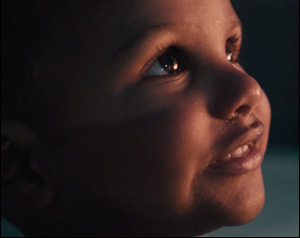If he was going to ask his subjects to put their blood, sweat and tears into what would become the documentary “Higher Love,” it was only fair that to pay for it Hasan Oswald was going to go the Robert Rodriguez route of film financing, selling his blood in order to keep cameras rolling. (The “Sin City” director famously paid for “El Mariachi” by volunteering himself for paid scientific studies.) It seemed like a small sacrifice relative to how much else Oswald invested in his debut feature, which inserts itself into the lives of Daryl and Nani, a couple in Camden, New Jersey who the director finds separated when Nani is pregnant with their first child. However, it isn’t Daryl who has abandoned Nani in her time of need, but rather the other way around when Nani is held in thrall to a dependency on meth with Daryl driving around in the dead of night attempting to find her.
When Oswald opens the door to a motel where Nani can be found with her dealer Iman, who is trying to get off the stuff as much as she is, “Higher Love” becomes a harrowing story of the fight for all the director trains his camera on not to give into their worst impulses in a city where desperation and despair can be found around every corner, a factory town where the machinery has gone quiet and there seems to be more people living on the streets rather than inside homes. Over the course of three years, Oswald is able to shed light on just how many are living on the edge through the story of Daryl and Nani, who struggle just to get through every day. After the film took home the Grand Jury Prize for Documentary earlier this year at the Slamdance Film Festival, it is now being released on digital and Oswald, who is currently filming his next documentary in the Middle East, graciously took time to talk about how he gravitated towards filmmaking after starting out as a teacher, thrusting himself into such a sensitive situation for his first film and how Daryl and Nani’s fraught relationship connects to our culture in America as a whole.
I was an English teacher in Thailand actually until 2016 and was traveling a lot, fooling around with cameras — cheap little GoPros — and teaching myself editing, but I never had interest in film. When I finished teaching, I was supposed to come back to New York where I’m from and do my master’s in education, but I just fell out of love with it and fell in love with film. I bought a camera, went to arguably America’s most dangerous city [where] my dad’s from, Camden, [which had] always been in the back of my mind as somewhere I’d like to explore. It’s old factories, but it has a really rich history as a boom town, and I stayed with my uncle who’s still in the region, would sell my blood to be able to afford gas and whatnot, and just went and knocked on doors and pretty soon I found the story I was going to tell.
From what I’ve heard this began as a broader portrait of Camden. Did Daryl, Iman and Nani’s stories come to the fore pretty early?
It was going to be a snapshot of the fall of post-industrial America, whether it was Camden, Flint, [or] Gary, Indiana — all these places that are just forgotten U.S. and then when I got to Camden, I realized that this was a story I had to tell. Well into post, it was a portrait of Camden, but then slowly, we started to strip that away, and I started to realize that Camden works as a backdrop unto which this portrait of systemic neglect could be projected onto, and it would be even stronger if I made it into Anywhere, post-industrial USA, to make it more approachable to the viewer who might have one of these cities in their backyard, one of these cities on the outskirts of where they live and it also could be any of those cities I mentioned.
But how did I know that it was going to be Daryl? You can see it in the film. He’s charismatic and well-spoken, so I knew right away he was going to not only help, but he was going to push the entire thread forward, and I actually met Nani and Iman that first night in the hotel [in] one of those first scenes [you see in the film]. I was moved by [Nani’s] story, because of course she’s a pregnant woman who is shooting drugs into herself, which as a filmmaker and a human, was incredibly alarming. and Iman has a great backstory — people don’t wake up one day and say, “I want to lose everything. I want to live in the gutter of Camden, New Jersey and shoot up heroin.” They have a story of what caused them to end up like that.
And then that night in the hotel, an angry guy called me on Nani’s phone, screaming at me, saying “How dare I?” and it was Daryl. The next morning, he wanted to meet up and I thought, “Alright, he’s going to beat me up,” but instead he said, “Let me tell you my side of the story.” And his side of the story is what we see in the film. I would still be with Nani and the group occasionally, but mostly [the film became] seeing it through his eyes, the obstacles of chasing Nani through the streets of a city that’s a petri dish of systemic neglect in America.
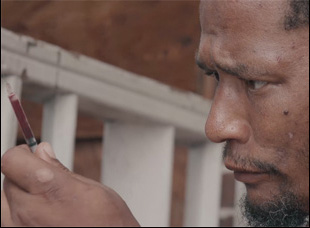
Yeah, it was tough. You grow close to these characters, so you want to help them in their mission, especially if it’s to improve themselves, but I knew where Nani was a lot when Daryl didn’t know where she was, and I told them right from the start that I wouldn’t be assisting in that kind of stuff. I would assist them in trying to find rehab centers, trying to find support on the streets, but they both knew right from the get go that I wouldn’t betray the other’s trust. That was tough, especially because a lot of Daryl’s journey is life and death, especially with his unborn son in Nani’s stomach, and it is tempting to want to give away her location or it is tempting when you’re with Nani and the relationship with Daryl isn’t going very smoothly to lead her to him. I had to rebuild that fourth wall and kind of separate myself from these personal relationships I had built.
Did this take you in any direction you hadn’t been expecting?
Addiction is very cyclical unfortunately. An addict or someone suffering from addiction will get stuck in this vicious cycle of stigma, especially in cities like this — the stigma of living in Camden is a heavy burden to carry, so that cyclical nature of addiction in itself caused me to write off any hope of recovery for these characters. As we progressed with Nani, I thought maybe she’ll be able to get clean and something might get triggered in her heart once the baby comes, where this love of her kid would overcome this love of drugs. Daryl had more hope for Nani than I did the whole time, as you can see in the film. I won’t spoil anything, but he’s all in with his attempts to get her clean and I was very surprised with where the film took Daryl and the strides he was able to take personally within himself – he’s been doing this a long time. I can’t imagine anything more painful than 10 years of the love of your life on the streets of Camden, New Jersey working all in nefarious ways in order to feed a habit that’s killing herself, killing his child and it was killing him. He’s had numerous health issues. As you can see in the film, he struggles with alcohol and anxiety depression, so I was very pleasantly surprised with where Daryl came from where he started when I first met him, screaming over the phone at me, to where he ended up. He’s doing so much better now.
Yeah, especially because this is my first edit and I loved everything. Our first cut was almost five hours and that was even painful to get it down that low. In the first minute of the film, you’ll see Daryl pull up to the old Campbell’s Soup Factory and we see for a moment this [couple] Maryann and Cliff, who live in that old soup factory. I was with them for a long time and they had a big portion of the film, so that was real hard [to cut], but we’ve been putting [some of the footage] up on our social media and structurally, I had an idea to start was Daryl’s obstacles through this city underwater [due to] systemic neglect, so for example, Daryl’s first stop was Cliff and Maryann, which we see briefly, and that was the fall of Camden when these factories came down and then Daryl’s next stop was going to be at a drug dealer because what happens when the factory falls, the jobs leave, and the vacuum fills with something. In this case, Camden is an open air drug market, and we had decided we were just going to stay with Daryl the whole time throughout this whole edit, and then [with] Iman, Nani she’s on this path towards recovery [as well], but her drug dealer, Iman, was also trying to get clean as you can see in the film, so it acted as this parallel. It was really tough structurally, but in the end, we went with our strongest thread and that was Daryl.
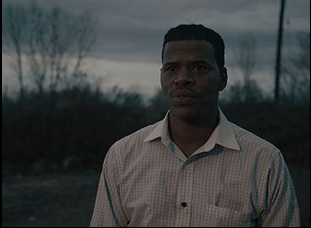
Yeah, I didn’t even have a filmmaking background — I went to a Waldorf School, which is a type of education where they don’t even allow media and I remember I was allowed to watch one movie until my teens. For some reason, I’d gone to the video store with these huge ideas and I’d always, always rent “Waterworld,” so I had probably the worst background in film possible. [laughs] I had a writing background, a small journalism background, but really everything was brand new to me and in my mind, that turned me into a blank slate and I really dove in, watching all the classics. I was really able to find what I liked and I’m not ashamed to admit I’ll take things as everyone does – I know what I like and I’ll copy it until I learn how to do it, whether that’s a jump cut or a certain sound of things and I’ll go from there. I still have imposter syndrome, feeling like I don’t belong, but we followed up the Slamdance Grand Jury win with immediately five more acceptances into pretty big festivals at the time and now I’m directing a film in Turkey on the Yazidi genocide and ISIS captives — back to Iraq for this’ll be my fifth trip there this year — so not only is it my calling, but yI just think back to what if I didn’t find this? Would I have done that masters program? Would I be in some miserable dead end job back in New York City? I don’t know. But it’s been everything I could’ve ever hoped for as far as a career. I found it late it life, but that’s okay. Now that it’s happening, it couldn’t be better.
“Higher Love” is now available on demand and on iTunes.




